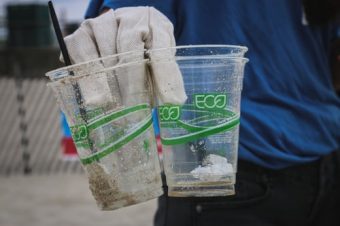
Is it all that it takes for one product to have labels such as eco, 100 percent natural, or 100 percent bio so that we are assured that buying it would do us and the planet good? How conscientious are we as consumers, and do we need to think thoroughly about what we buy? Although big corporations that control the market are turning to green economy apace, environmental activists make known that not everything is as it seems and that each one of us has rights, opportunities, and obligations to act upon the market and to control big players.
We are all familiar with Nestlé products. There is hardly a consumer who hasn’t tasted their coffee, chocolate, muesli, or ice cream, and to some consumers, the Nestlé products are their cup of tea. Nestlé has been building up its reputation for 150 years, ever since the Swiss entrepreneur, Heinrich Nestlé has made a successful baby milk formula for the first time in the middle of the 19 century. Soon after that, also the first milk chocolate. Today, Nestlé is the biggest food company globally, the multinational corporation that runs the business in 189 countries, owns 447 factories, and employs 339,000 people. At the same time, it is one of the biggest stock owners of L’Oreal, the largest cosmetics company in the world. No, we are not advertising this famous brand. Instead, this serves as a mere illustration of how much Nestlé products took over

the market and to what extent companies with mass production affect our lives and the planet’s health. Yet, has this enormous impact one company has, being followed by proportionally large social and environmental responsibility in the way they run business and production?
The people from the Nestlé company will tell you that environmental protection is crucial to them. As a signatory of the Charter of the United Nations, Nestlé has committed to introducing particular measures to fight climate change, aiming that by 2030 it cuts its emissions of greenhouse gases by half. In contrast, by 2020, it should reach zero impact on the environment.
“The largest potential of the Nestlé company for that lies in agriculture. We are focused on preserving and restoring the forests, agroforestry, regenerating agricultural practices, and soil protection. Just the last sector, we can make an impact on up to 70 percent of emissions“, says Ivanka Stojnić, the manager for sustainable development at the Nestlé company for the Southeast European market.
In focus:
A green business strategy, such as this one, is something that almost all big companies today take as indispensable. Environmental activists generally accept big companies with a grain of salt, while the ones more radical take them a priori as bad guys. Milja Vuković, the founder of Facebook group Zero&Low Waste Serbia, has critical approaches to big corporations. She tries to put them in perspective, being aware that the companies have an immense responsibility in this historical moment and that it is of great importance they start to change their approaches. As a committed environmental activist with strong beliefs in civil actions, she notes that it is up to us, namely citizens, and up to legislation to make demands, support, and monitor. According to her, the main problem is that, despite all green strategies, we are still stuck in consumerism which has brought us to the global collapse in the first place.

“Consumer capitalism concept, embodied in the big corporation, is based on the ideology of constant growth. That approach is utterly unsustainable. It isn’t a solution to transition to a green economy or regenerative agriculture if we still remain affixed to constant growth ideology. For, what is the thing that actually grows? Does social justice grow, or the investments in education and art? Do we have a healthier environment, or are the people healthier and happier? What is the thing that grows in our modern societies? The amount of waste grows, which at rapid speed destroys the planet. The profit grows since the full human potential is reduced to become consumer”, says Milja Vuković.
She gives one very illustrative example: At the moment, we globally produce 120 percent of food necessary to feed the entire world population. At the same time, we throw away an unprecedented quantity of food that amounts to 30-40 percent. In other words, we produce so that companies make their projected profits, not to feed the people.
Undoubtedly, a green strategy is essential to make production more environmentally friendly, preserve the environment, take care of waste, use more clean energy, and produce packaging safer for the environment. Many big corporations already adopted these targets, including Nestlé, which in 2018 used for its production of 34.5 percent of electricity from renewable energy sources.
“As for Serbia, at the beginning of 2019, we signed the agreement with EPS for purchase of 100 percent green energy generated in hydropower plants. This way, we have already reached the specific goal locally”, says Ivanka Stojnić, offering further details on their factory in Surčin, which has become in 2019 the first facility reaching the Zero Waste to Landfill goal. That means that not even a single gram of waste from the factory goes to a landfill. Still, it is recycled and used for other purposes, while the food residues are used for organic fertilizer production. “And that’s not the end. We keep on reducing the energy consumption in the factory and replacing our packaging by introducing recyclable materials. The question of plastic waste, which can’t be recycled but ends up in our environment, also is one of the critical challenges the world is facing. Therefore, Nestlé has committed to making 10 percent of packaging produced in factory recyclable by 2025 and reducing virgin plastic usage by a third in the same period. With all investments so far, we have made recyclable 87 percent of our total packaging and 66 percent of plastic packaging.
Taking that green path, we continue investing in new technologies and substantial changes of our products and business around the globe”, says Ivanka. Although this corporative policy is something Milja Vuković advocates for, she mentions that consumers and citizens must follow these processes and buy, if we are environmentally aware, exercise self-control.
“Being informed buyers, we can support the product with environmentally friendly packaging, namely the naked ones. That means they have no packaging, or they were made of recyclable materials or materials from renewable sources. We need to know and control the percentage of collection and recycling of that specific material in our country. Otherwise, it ends up on landfill again, despite the theoretical possibility for its recycling”, she says and adds that the same goes for green energy use and that we should demand the transparency of production process and sale of this kind of energy.
Prepared by: Jovana Canić
Read the story in the new issue of the Energy portal Magazine WATER RESOURCES.



